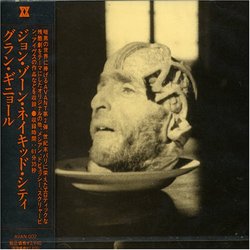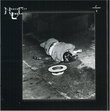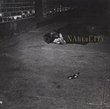| All Artists: Naked City, John Zorn Title: Grand Guignol Members Wishing: 2 Total Copies: 0 Label: Avant Release Date: 10/21/2002 Album Type: Import Genres: Alternative Rock, Jazz, Rock, Metal Styles: Avant Garde & Free Jazz, Progressive, Progressive Rock, Thrash & Speed Metal Number of Discs: 1 SwapaCD Credits: 1 |
Search - Naked City, John Zorn :: Grand Guignol
 | Naked City, John Zorn Grand Guignol Genres: Alternative Rock, Jazz, Rock, Metal
John Zorn Teams Up with Bill Frisell, Wayne Horvitz, Fred Frith, Joey Baron, and Yamatsuka Eye. |
Larger Image |
CD DetailsSynopsis
Album Details John Zorn Teams Up with Bill Frisell, Wayne Horvitz, Fred Frith, Joey Baron, and Yamatsuka Eye. Similar CDs
|
CD ReviewsDark Serenity Turns to Darker Violence stu | 06/06/2004 (5 out of 5 stars) ""Grand Guignol" is John Zorn's tribute to the infamous Parisian Museum of the macabre and to the darker side of us all. It begins with renditions of selected (roundabouts) 20th Century classical pieces, including Debussy's impressionst, "The Sunken Cathedral." I love Zorn's interpretations of these pieces, especially the Debussy. I have heard criticism of Zorn's interpretive abilities before, regarding this record as well as "Spy Vs. Spy," "The Big Gundown," and others. Well, I see it differently. Even on the rare occasion that he makes a choice that I don't agree with, I still appreciate where he is coming from. He is very specific in his intent as an interpreter and he does not, as detractors have stated, simply eliminate or replace the original emotion of the piece, but rather, magnifies certain aspects, modifies others; he uses his imagination and filters the music through his own very strong personality and paradigm. In short, he does what an interpreter/arranger should do. It is what any composer does when he assumes this role. I digress.Suddenly, Grand Guignol changes directions severely and assaults the listener with the most cynical, brutal music imaginable. The cacaphony is interspersed with snippets of cliched, calculted insincerity. This music is heartless, but it is this heartlessness that gives it its heart. It is that strange post-modern phenomenon when irony turns back in on itself and becomes sincerity. In a chaotic world that is only becoming more and more so, truly nihilistic art can strike a sentimental chord. You cannot escape the grotesque, detatched, ugliness of this record. If you let it, it will take you places. Great performances from the whole band." Great sophmore effor from Zorn & co. Michael Stack | North Chelmsford, MA USA | 03/25/2005 (4 out of 5 stars) "In case anyone were to think Zorn's Naked City project would even attempt to repeat their previous album, Zorn and company produced something wholly other. The album essentially comes in three sections-- the title track, ranging at 17 minutes, a series of covers of works by Debussy, Scriabin, Di Lascus, Ives and Messiaen, and 33 "hardcore miniatures", none of which are longer than 1:18 and most of which hover around 30 seconds. I'll tackle the album in its sections.
The first part, "Grand Guignol", is stunning. Drums over ambient haze open the piece which moves through dark, chruning, delicate, quiet, sensual moods, building to something only to explode about ten minutes in, but just when you think its fired in intensity, it collapses back to its structure, only now more prodding, more urgent. This exchanges with the aggressive sections for the rest of the piece. What is compelling is that Zorn manages musically to portray something dark and horrible, the fear and horror the theatre sought to portray is clearly illustrated in this music. And Zorn's crying sax towards the end (around 12 minutes) of the piece is among the most anguished any performance on the instrument has ever been given. The second part is quite unexpected, given the context of the other Naked City material-- the pieces performed are rendered with a stunning beauty, almost orchestral in many cases, there's no genre bending to speak of, the performances are pretty straight. The Debussy piece in particular is startling for its orchestral beauty, and Bob Dorough guest appearance and eccentric vocal style does great things for "The Cage" (Ives). The third part is really kind of hard to describe-- in each of these pieces, the challenge appears to be to make a coherent statement in a genre or six in a brief time. Remarkably, this works a whole lot better than you would anticipate-- several of the tracks are standout, but really its all quite stunning, in both its intensity and its ability to BE coherent in such a short amount of time, and even more remarkable is that the only time I lose interest listening to this form is when the pieces stretch slightly longer, it seems to be a genre built for 30 seconds. While much of it is remarkable ("Thrash Jazz Assassin", "Bonehead", "Billy Liar"), its really "Speedfreaks" that qualifies of note. It somehow manages to change roughly every two and a half seconds, quoting literally a couple dozen songs in the act, and yet, somehow, unbelievably, it sounds coherent. This one is a bit less accessible (if that makes sense) than and doesn't hold together quite as well as the Naked City debut, but its quite interesting, and it has a nice range of material on it. Recommended." |

 Track Listings (29) - Disc #1
Track Listings (29) - Disc #1
